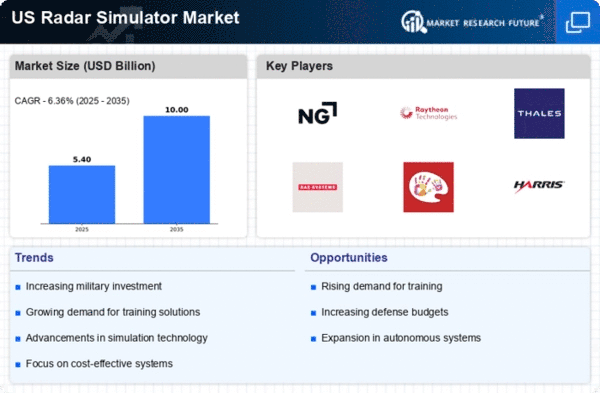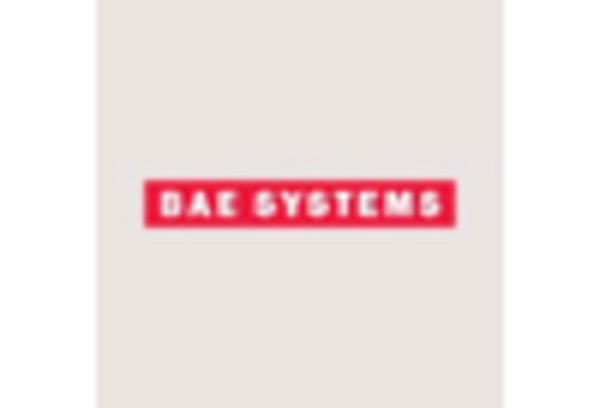Growing Defense Budgets
The radar simulator market is experiencing growth driven by increasing defense budgets in the US. The government has allocated substantial funds to enhance military capabilities, with a focus on advanced training systems. In 2025, the US defense budget is projected to exceed $800 billion, with a significant portion earmarked for simulation technologies. This investment is likely to bolster the radar simulator market, as military branches seek to improve operational readiness and effectiveness through realistic training environments. The emphasis on high-fidelity simulations to prepare personnel for complex scenarios indicates robust demand for radar simulators. These simulators are essential for training in air defense, naval operations, and ground forces.. As defense spending continues to rise, the radar simulator market is poised for substantial growth, reflecting the strategic importance of advanced training solutions in national security.
Rising Need for Civil Aviation Safety
The rising need for safety in civil aviation significantly influences the radar simulator market.. With the increasing volume of air traffic, regulatory bodies are emphasizing the importance of training for air traffic controllers and pilots. The Federal Aviation Administration (FAA) has mandated enhanced training protocols, which include the use of radar simulators to ensure that personnel are well-prepared for real-world scenarios. The market for aviation training simulators is projected to reach $3 billion by 2026, reflecting a growing recognition of the need for effective training solutions. This trend is likely to drive demand for radar simulators, as they provide critical training for managing complex airspace and emergency situations. The emphasis on safety and compliance in the aviation sector is expected to bolster the radar simulator market, highlighting its role in enhancing operational efficiency and safety standards.
Integration of AI and Machine Learning
The integration of artificial intelligence (AI) and machine learning technologies is revolutionizing training methodologies in the radar simulator market.. These advancements enable the development of adaptive training systems that can tailor scenarios to individual user performance, enhancing learning outcomes. AI-driven analytics can provide real-time feedback, allowing trainees to improve their skills more effectively. The market for AI in simulation is expected to grow at a CAGR of over 20% through 2027, indicating a strong trend towards incorporating intelligent systems in training environments. This shift not only improves the realism of simulations but also reduces training costs by optimizing resource allocation. As military and civilian sectors increasingly adopt these technologies, the radar simulator market is likely to expand, driven by the demand for innovative training solutions that leverage AI capabilities.
Expansion of Military Training Programs
The expansion of military training programs in the US drives the radar simulator market.. As military operations become increasingly complex, there is a pressing need for comprehensive training solutions that can replicate real-world conditions. The Department of Defense has initiated various programs aimed at enhancing training capabilities, which include the integration of advanced radar simulation technologies. In 2025, the military training market is anticipated to grow by approximately 15%, with radar simulators playing a crucial role in preparing personnel for diverse operational scenarios. This growth is indicative of a broader trend towards immersive training environments that utilize cutting-edge technology. The radar simulator market is likely to benefit from this expansion, as military branches seek to invest in high-quality training tools that improve readiness and effectiveness.
Technological Innovations in Simulation
Technological innovations in simulation are driving advancements in the radar simulator market. The development of high-fidelity graphics, virtual reality (VR), and augmented reality (AR) technologies is enhancing the realism of training simulations. These innovations allow for more immersive training experiences, which are essential for effective skill development. The market for VR and AR in training is projected to grow at a CAGR of 30% through 2028, indicating a strong trend towards adopting these technologies in various sectors, including defense and aviation. As organizations recognize the benefits of realistic training environments, the demand for radar simulators that incorporate these technologies is likely to increase. This trend suggests a promising future for the radar simulator market, as it adapts to the evolving needs of training and operational readiness.

















